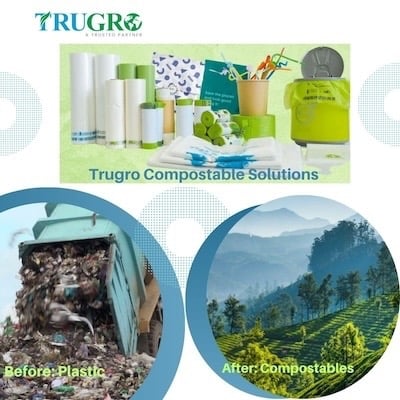Compostable Solutions: A Path Towards a Sustainable Future
This post describes the harmful effect of plastic. Compostable products are alternate and its benefit to the nature. Finally how Trugro can help in providing compostable solutions.
Nitin Sharma
12/2/20233 min read


The Harmful Effects of Single-Use Plastics Single-use plastics (SUPs) are designed for short-term use, but their environmental impact lasts for centuries. Here are some of the most damaging effects of plastics:
1. Non-Biodegradability Plastics can take anywhere from 500 to 1,000 years to decompose. This means that the plastic water bottle you use today will still be around for your great-grandchildren. Plastics do not biodegrade; instead, they break down into smaller pieces called microplastics, which infiltrate soil, air, and water, causing a ripple of harmful effects on both wildlife and human health. `
2. Ocean Pollution It’s estimated that over 8 million tons of plastic enter the oceans every year. These plastics not only form massive garbage patches, like the Great Pacific Garbage Patch, but also lead to the death of marine life. Sea creatures, from fish to whales, often mistake plastic for food, leading to suffocation, poisoning, or starvation as their stomachs fill with non-digestible materials.
3. Harm to Wildlife Plastic pollution poses a lethal threat to wildlife. Birds, turtles, and mammals often become entangled in plastic waste, leading to injury or death. Additionally, ingestion of plastic debris is widespread and can cause blockages in animals' digestive systems, leading to starvation or poisoning from toxic chemicals.
4. Greenhouse Gas Emissions The production of plastic involves the extraction and refinement of fossil fuels, which releases large amounts of greenhouse gases into the atmosphere. This process significantly contributes to global warming and climate change.
5. Health Risks to Humans Plastics contain harmful chemicals such as bisphenol A (BPA) and phthalates, which can leach into food and beverages when used in packaging. Prolonged exposure to these chemicals has been linked to a range of health issues, including cancer, endocrine disruption, and reproductive problems.
Compostable Alternatives: A Sustainable Solution In the battle against plastic pollution, compostable products have emerged as a viable and eco-friendly alternative. These products, when disposed of properly, decompose much faster than plastics and don’t leave behind toxic residues. Here’s how compostable solutions can make a difference:
1. Biodegradability Compostable materials are made from natural, renewable resources like corn starch, sugarcane, and plant fibers. When composted, they break down into organic matter within months, as opposed to the centuries it takes for plastics to degrade. This helps significantly reduce the volume of waste accumulating in landfills and oceans.
2. Reduced Pollution By replacing plastic products with compostable alternatives, we can reduce the harmful accumulation of microplastics in the environment. Compostable carry bags, garbage bags, and packaging can return to the earth as organic matter, enhancing soil health rather than harming ecosystems.
3. Lower Carbon Footprint Compostable products are typically made from plant-based materials, which require less energy and produce fewer greenhouse gases during production. This lower carbon footprint is crucial in mitigating climate change and supporting a more sustainable production cycle.
4. Toxic-Free Decomposition Unlike plastics that can release harmful chemicals as they degrade, compostable materials break down into non-toxic compounds, such as water, carbon dioxide, and organic matter. This means no leaching of harmful substances into the soil or waterways. 5. Closing the Loop Compostable products support a circular economy. After use, they can be returned to the earth through composting, where they enrich the soil and help grow new plants—completing the cycle of sustainability.
Compostable Solutions for Everyday Use Many of the products that are major contributors to plastic waste can now be replaced with compostable alternatives. Here are some of the most impactful single-use items that can be transitioned to eco-friendly versions:
1. Compostable Carry Bags Whether for groceries, retail, or personal use, compostable carry bags offer a clean and convenient alternative to plastic bags. They decompose easily, leaving no harmful traces in the environment.
2. Compostable Garbage Bags Traditional garbage bags made from plastic contribute heavily to landfill waste. Compostable garbage bags, when used correctly, can be processed through industrial composting, turning waste into a useful resource.
3. Compostable Cutlery Plastic utensils are often used for a few minutes but remain in the environment for centuries. Compostable cutlery, made from materials like bamboo or cornstarch, can be disposed of after use and will break down naturally.
4. Compostable Packaging Switching to compostable packaging for food, beverages, and consumer goods helps reduce the footprint of plastic waste. These materials are also safer for human health, as they don’t contain harmful chemicals found in plastic packaging.
Conclusion: A Collective Responsibility The shift towards compostable solutions isn’t just an option—it’s a necessity. As individuals, businesses, and governments work together to replace harmful plastics with sustainable alternatives, we can begin to repair the damage caused by decades of pollution. At Trugro Exporters, we are committed to this mission. Our compostable products, including carry bags, garbage bags, cutlery, and packaging, are designed to offer an eco-friendly alternative to plastics, ensuring that every transaction between humans and nature is harmonious. Now, more than ever, the choice is clear. Let’s move towards a plastic-free future, one compostable solution at a time.
MORE UPDATES ON
Home
At Trugro Exporters, we envision a world where businesses and consumers can thrive without compromising the well-being of our planet. Join us on our journey to make a positive impact—one sustainable solution at a time. Together, let’s create a future where nature and innovation flourish hand in hand.
FAQs